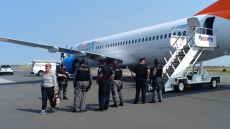OTTAWA - A train operator's level of fatigue, sleep patterns and ability to "make effective, safe decisions" were among the risk factors singled out in Transport Canada guidelines for single-person train operations — advice that was finalized just months before the Lac-Megantic rail disaster.
More than a dozen "human factors" such as amount of sleep, health, age, lifestyle and workload demands — and the best way to deal with them — were flagged for departmental rail safety reviewers, records obtained under the Access to Information Act show.
The Transport Canada guidelines, finalized May 13, 2013, were intended to help Transport Canada staff evaluate risk assessments filed by railways operating trains with just a single employee.
On July 6 last year, a 72-car train parked for the night came loose and rolled into the town of Lac-Megantic, Que., creating a fireball that killed 47 people, destroyed buildings and contaminated waterways.
The now-defunct Montreal, Maine and Atlantic Railway Ltd. and three employees of the company — including the train's sole operator — face charges of criminal negligence causing death.
The federal Transportation Safety Board is set to release its final report Tuesday on the devastating accident, including the railway's use of a one-man crew on the route.
A preface to a March 2013 draft of the guidelines says they were aimed at promoting "uniformity and industry best practices" with respect to the safe management of single-person train operations.
"Ultimately it is the railway company's responsibility to ensure the safety of its operation," the document says.
With regard to human factors, the guidelines recommended a railway running a one-person operation review its existing "fatigue management plan" to ensure it included advance notification of work schedules, the opportunity to nap as required and proper shift rotations, breaks and work/rest cycles.
The guidelines also called for procedures to:
— Deal with situations when an employee judges himself unfit for work if called unexpectedly
— Ensure the train operator has taken health and fitness training and a recent medical exam
— Provide such lone operators with "specific training" and furnish proof of successful completion to Transport Canada upon request
The guidelines address several other areas such as speed restrictions, performing en-route inspections, communication protocols, accuracy of reports and handling emergencies.
The guidelines flowed from a national rail safety working group that relied in part on a March 2012 study carried out for Transport by the National Research Council of Canada. The study looked at the single-person train operations of Montreal, Maine and Atlantic and the Quebec North Shore and Labrador railways, relevant safety board accident investigations, and similar one-person rail operations around the world.
"It is recognized that reducing the train crew to one person without appropriate operational changes and technological intervention diminishes safety," says the research council report, released under the access law.
Steps taken to reduce those risks — including sustained training, educational programs and specially designed operational procedures — should be done in "a comprehensive and systemic manner," the study adds.
In reviewing Montreal, Maine and Atlantic's 2009 risk assessment for running one-person operations, the study found the railway had made "several operational changes" including additional training for engineers and other employees such as dispatchers, tailored emergency response procedures, and "operator scheduling and fatigue considerations."
The guidelines and study were among several internal documents included in a briefing package for the deputy minister of Transport Canada on July 13 last year, a week after the Quebec disaster.





